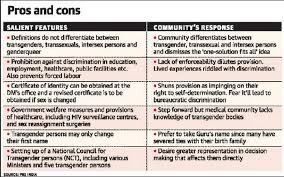Source: thehindu.com
On August 5, the Lok Sabha passed the Transgender Persons (Protection Of Rights) Bill, however, news about the legislation got buried as it was the same day that the Centre decided to revoke special status for Jammu and Kashmir.
While the nation grappled with the implications of amending Article 370, the transgender community took a closer look at the Bill that was supposed to protect their rights, and found that barely any of their demands had been included.
“The government makes rules without consulting us and it does not make any difference to our lives,” says Payal, a transgender from north Delhi.
“Our problems go much beyond a Bill. Only educated people know about the legislation,” says Shivanya, a transgender who has been associated with the Srijan Foundation for over two years.
Started in August 2008, the foundation, located near Adarsh Nagar metro station, has worked incessantly for the welfare of the transgender community.
Recalling the painful process to get an Aadhaar card that ended up involving the District Magistrate, MLA, a doctor and the Sub-Divisional Magistrate, Shivanya adds: “I know my problems will not be solved. I cannot even use washrooms when I go out in public.”
Fareen, another transgender associated with the foundation, says: “People do not give us jobs and insult us behind our back. What do we do if no one employs us?”
On the day Parliament announced the amendment to Article 370, the Lok Sabha also passed the revised transgender Bill.
The legislation has been criticised by the transgender community for replacing district screening committees with bureaucratic impediments.
They have also highlighted that the provisions against discrimination have no enforceability. The Bill has also attracted disapproval for only providing separate definitions for intersex persons but no provisions for transgenders.
According to the Bill, a transgender is a person whose gender does not match with the one assigned at birth and includes transman or transwoman (whether or not such person has undergone sex reassignment surgery or hormone therapy or laser therapy), person with intersex variations, gender-queer and person having such sociocultural identities as ‘kinner’, ‘hijra’, ‘aravani’ and ‘jogta’.
Online media platform, Feminism in India, posted an elaborate critique highlighting the shortcomings of the Bill in an article published on August 5.
“The Bill has come to Parliament in this context of apathy, neglect and secrecy. A series of betrayal of assurances and a convolution of a law that would do nothing for the trans community and would rather snatch away the bare minimum that existed [sic],” it stated.
“An ideal Bill would be different and have separate provisions for transgender, transsexual and intersex persons,” said Umesh, manager of the foundation.
He claims that transsexual persons lead a very different life compared to a transgender. On the subject, Payal added that intersex persons more often than not align themselves with one of the sexes and “do not possess talents like that of a transgender”.
The new Bill states that transgenders, while obtaining a certificate, “shall be entitled to change the first name on the birth certificate”. This clause has not been well received in the community. “Our families often do not wish to associate with us. The community is our family. We should be allowed to take our guru’s name. They have given us everything,” says Shivanya.
Feminism in India believes that this provision alludes to the “impervious nature of caste in Indian society”.
Talking about Sex Reassignment Surgery (SRS), Payal pointed out that “in Delhi, these surgeries are only cosmetic and can cost up to ₹1 lakh, making them unaffordable”.
She added that a proper surgery is done only in Thailand, citing the example of celebrity Gauri Arora, who underwent a sex change surgery there.
Chandini, a transgender linked with the foundation since its nascent stage, dismisses the Bill saying “there always are problems”. Shivanya, however, still harbours some hope that the Bill could have a positive impact despite its many flaws.
